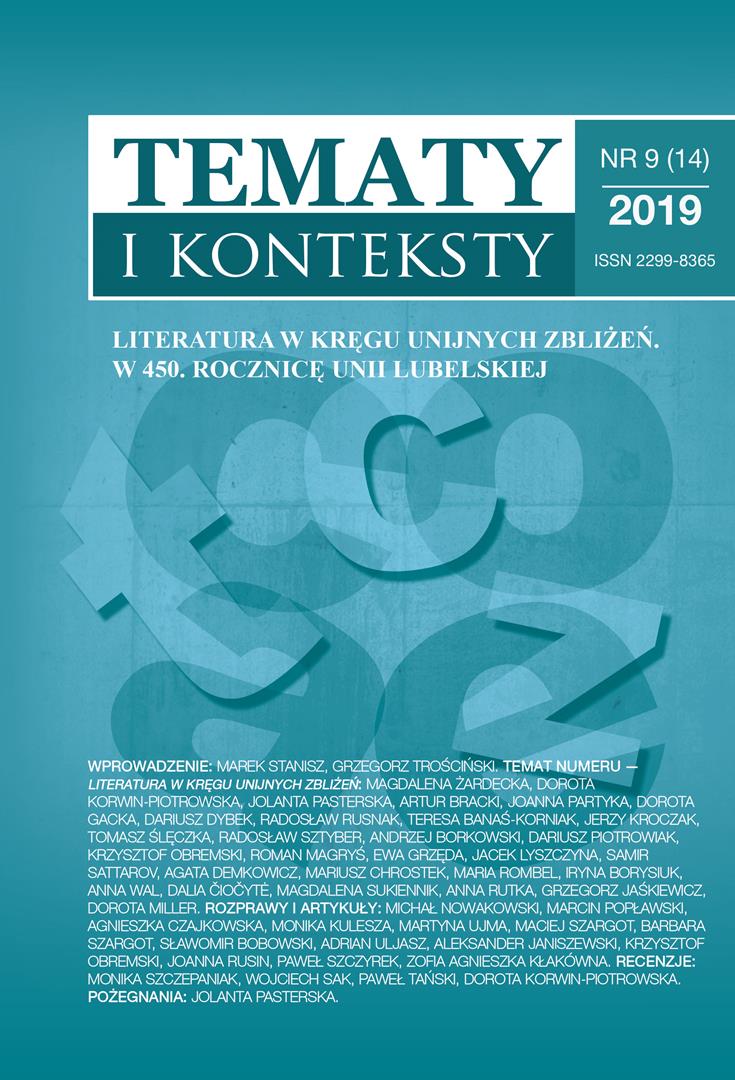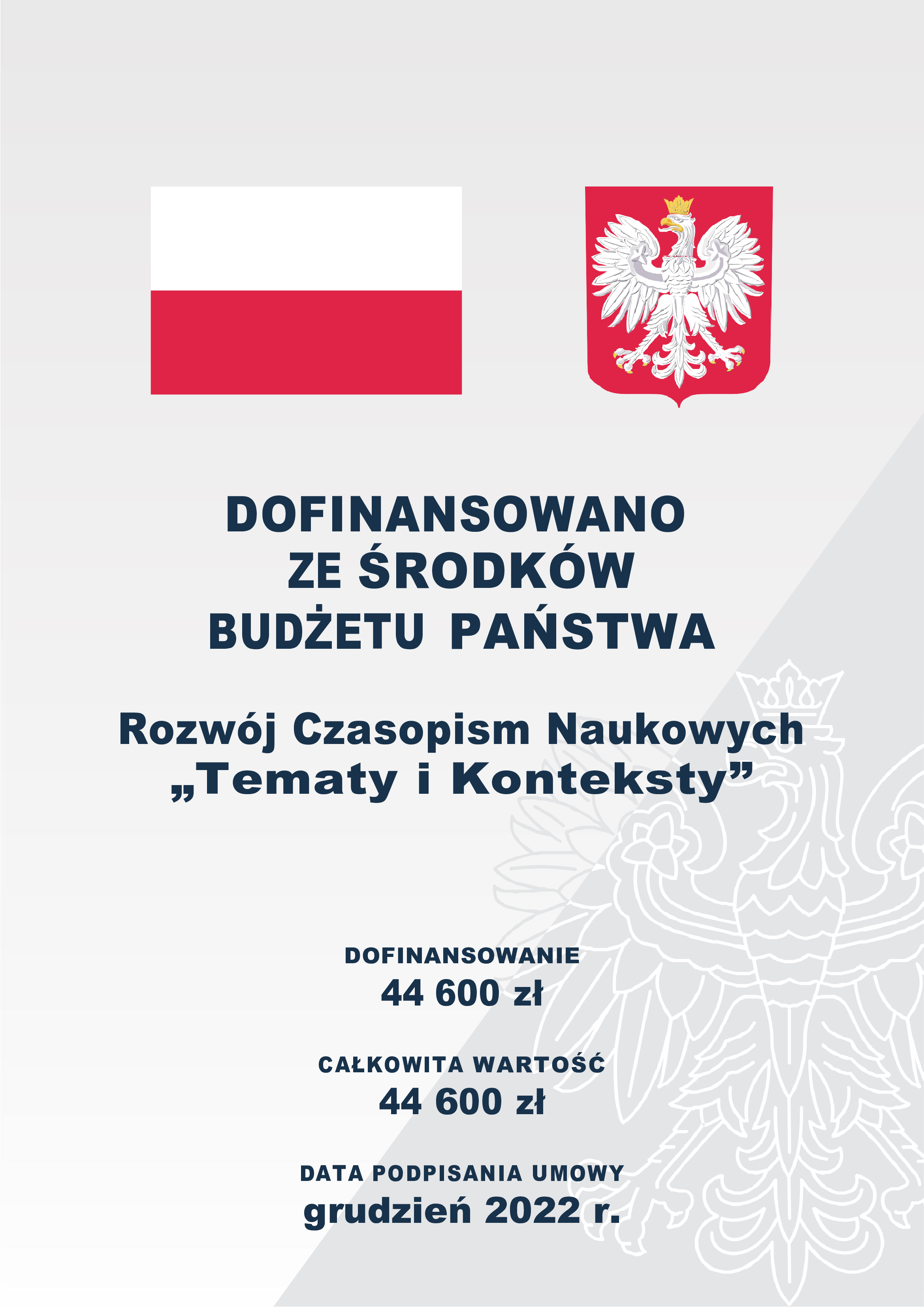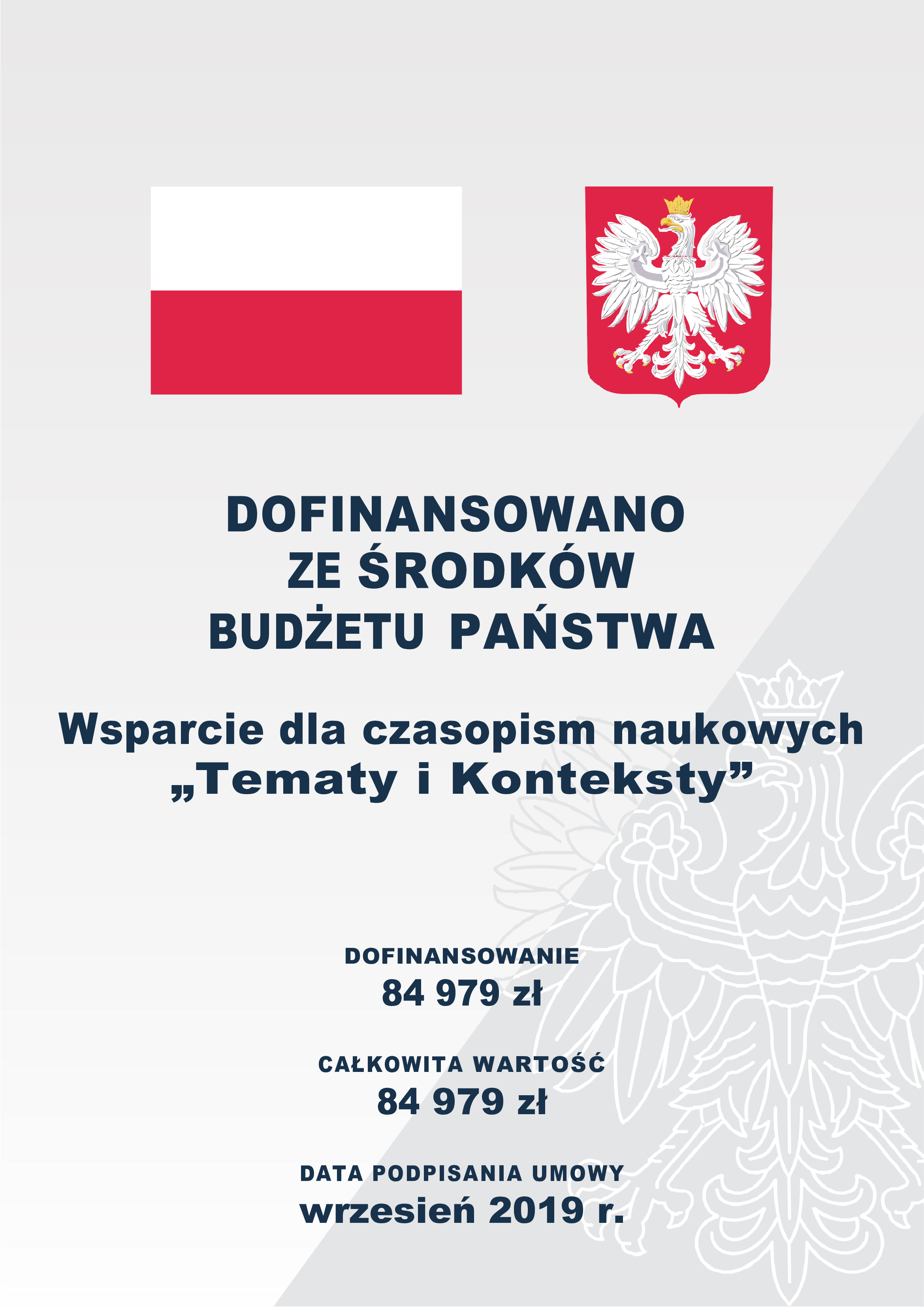Pozorna unia… Rzeczpospolita, Polacy i rodzina narodów słowiańskich w Wywodzie Dembołęckiego (geneza – znaczenie – predestynacja)
DOI:
https://doi.org/10.15584/tik.2019.13Słowa kluczowe:
megalomania narodowa, Wojciech Dembołęcki, sarmatyzm, polska historiozofiaAbstrakt
The sketch is an attempt at presenting Wojciech Dembołęcki’s views (contained in Wywód jedynowłasnego państwa świata [Treatise on the only True Country of the World]) on some issues, especially political issues, concerning the authority of Poles and its origin. The book published in 1633 (Warsaw) seems to be very controversial for its reader may find a lot of megalomaniac concepts often based on presumptions, historical usurpations, re-interpretations or simply naive etymology. The mentioned manipulations in the sphere of philosophy of history allowed the author to come to incredible conclusions. The fundamental one is connected with the first ever language that was spoken in paradise. The Franciscan writer convinced it was the Slavic tongue (“słowiański” from the Polish “słowo” – “word”), in effect Slavs must have been the oldest people of the world. There are numerous consequences of such an assumption, nevertheless the Poles were particularly privileged – as noble descendants of Adam and Eve – and only they participated in the mankind development process, they were responsible for civilization achievements, founded first ever cities, established the state system (and even regalia), defeated various military powers in the past, etc. Therefore, they allegedly had an exclusive right to rule countries and nations of the whole globe. This is the most important message of the book in question, although the author himself probably did not believe in his own imaginary theory fabricated just for show and because of overly ambitious Polish noblemen’s needs.
Downloads
Bibliografia
Bartoszewicz J., Studia historyczne i literackie, t. 2, Kraków 1881.
Bekanus J. G., Hermathena – Hieroglyphica – Vertumnus – Gallica – Francica – Hispanica, wyd. L. Torrentius, Antwerpia 1580.
Bentkowski F., Historia literatury polskiej, t. 1, Warszawa – Wilno 1814.
Bystroń J. S., Megalomania narodowa, w: Jan Stanisław Bystroń. Tematy, które mi odradzano, oprac. i wstęp L. Stomma, Warszawa 1980.
Czarczyński P., Między „święta prawdą” a herezją – Biblia w „Wyodzie jedynowłasnego państwa świata” Wojciecha Dembołęckiego, „Tematy i Konteksty” 2016, nr 6 (11).
Eco U., Od drzewa do labiryntu. Studia historyczne o znaku i interpretacji, tłum. G. Jurkowlaniec, M. Surma-Gawłowska, J. Szymanowska i A. Zawadzki, Warszawa 2009.
Estienne C. (C. Stephanus), Dictionarium historicum ac poeticum, Paryż 1553
Genebrard G., Chronographiae libri quatuor, Paryż 1580.
Gloger Z., Encyklopedia staropolska ilustrowana, t. 1, Warszawa 1900.
Gloger Z., Encyklopedia staropolska ilustrowana, t. 3, Warszawa 1902.
Grabski A. F., Zarys historii historiografii polskiej, Poznań 2000.
Joan. Goropii Becani Origines Antwerpianae sive Cimmeriorum Becceselana, Antwerpia 1569.
Jurewicz K., Wojciech Dębołęcki i jego „Wywód...”, „Terminus” 2007, z. 1 (16).
Kochańska M., Ksiądz Wojciech Dembołęcki z Konojad, „Zeszyty Naukowe Uniwersytetu Wrocławskiego. Prace Literackie” 1956, t. 1, Seria A, nr 2.
Kufel S., Rokoko, Zielona Góra 2017.
Leibniz G. W., New Essays Concerning Human Understanding, wyd. A. G. Langley, Whitefish 2003.
Linde S. B., Prawidła etymologii przystosowane do języka polskiego (§ 2), w: tegoż, Słownik języka polskiego, t. 1, cz. 1, Warszawa 1807.
Marek Junianus Justynus, Zarys dziejów powszechnych starożytności na podstawie Pompejusza Trogusa [z dodaniem prologów], przeł., wstęp i oprac. I. Lewandowski, Warszawa 1988.
Ogonowski Z., Z dziejów megalomanii narodowej, w: Filozofia polityczna w Polsce XVII wieku i tradycje demokracji europejskiej, Warszawa 1992.
Ossoliński J. M., Początki Sławian, „Czasopismo Naukowe od Zakładu Narodowego im. Ossolińskich Wydawane” [Lwów] 1831, z. 2.
Partyka J., Etymon i emocje: uczone spory wokół najstarszego języka świata, „Forum Artis Rhetoricae” 2013 (3).
Poeci polskiego baroku, wstęp, wyb. i oprac. J. Sokołowska i K. Żukowska, t. 1, Warszawa 1977.
Puzynina J., Ze staropolskich teorii pochodzenia narodu i języka polskiego (Wojciech Dembołęcki), „Poradnik Językowy” 1955, z. 10.
Reychman J., Od wieży Babel do językoznawstwa porównawczego, Warszawa 1969.
S. Eusebii Hieronymi Stridonensis Presbyteri Liber de nominibus hebraicis, t. 23, wyd. J. P. Migne, Paryż 1884 (Patrologia Latina).
Scaligerana, Kolonia 1667.
Schedel H., Kronika świata, Norymberga 1493.
Sztyber R., Do zoila nie-zoila, bo Gryzosława, „Zeszyty Naukowe Uniwersytetu Rzeszowskiego, Seria Filologiczna: Historia Literatury”, z. 65 (5), red. M. Nalepa, Rzeszów 2010.
Sztyber R., „Skądże to zbłaźnienie świata”? Wojciecha Dembołęckiego „Wywód jedynowłasnego państwa świata (studium monograficzne i edycja krytyczna), Zielona Góra 2012.
Tuwim J. , Pegaz dęba, czyli panopticum poetyckie, Kraków 1950.
Wójcicki K. W., Historia literatury polskiej w zarysach, t. 2, wyd. II, Warszawa 1859.
Pobrania
Opublikowane
Jak cytować
Numer
Dział
Licencja
Prawa autorskie (c) 2019 Tematy i Konteksty

Utwór dostępny jest na licencji Creative Commons Uznanie autorstwa – Użycie niekomercyjne – Bez utworów zależnych 4.0 Międzynarodowe.




